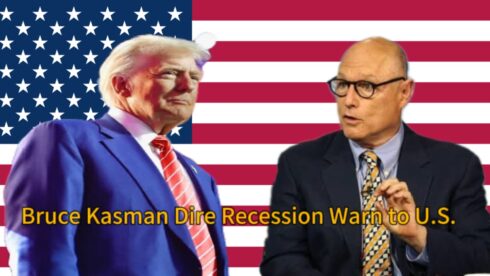Chief Economist, Bruce Kasman warns -“Where we stand now is with a heightened concern about the U.S. economy”. He has raised the odds of a full-blown recession to a staggering 40%, a sharp increase from his 30% estimate at the start of the year. According to Bruce Kasman, Donald Trump’s erratic trade policies and aggressive tariffs have thrown markets into chaos, creating a dangerous environment for businesses and investors alike.
Bruce Kasman cautions that if Trump proceeds with his proposed reciprocal tariffs, the risk of recession could climb above 50%. “If we continue down this road of more disruptive, business-unfriendly policies, I think the risks on that recession front would go up,” he explained. The economic fallout, he argues, could be severe, triggering long-term damage to market confidence and global trade relationships.
Trump’s Tariff War: Economic Strategy or Self-Inflicted Wound?
“The risk that tariffs will do lasting damage to the economy is not something I would, by any means, underplay,” Bruce Kasman asserts. He argues that Trump’s trade war—originally positioned as a strategy to bolster American manufacturing and reduce trade deficits—has instead created widespread uncertainty and financial strain.
As tariffs on China, the European Union, and Mexico escalate, American businesses are left struggling with rising import costs and disrupted supply chains. Manufacturers, particularly in industries reliant on global materials, are seeing profit margins shrink. “Businesses thrive on stability,” Bruce Kasman points out. “When policy shifts are unpredictable, companies delay investment, hiring, and expansion.”
Investor Confidences Plummets: America No Longer a Safe Haven?
“The U.S. has long been viewed as a place where investors feel comfortable about the rule of law, the integrity of information flow, and the predictability of economic policy,” Kasman states. However, he warns that Trump’s leadership is eroding this trust, pushing investors to reconsider their reliance on U.S. assets.
Bruce Kasman describes the U.S.’s historic “exorbitant privilege”—the ability to attract global capital at lower costs due to the country’s economic stability. But now, he says, “If that privilege begins to erode, we could see rising borrowing costs, weaker capital inflows, and a fundamental shift in the attractiveness of the dollar.” The consequences, he suggests, could last for decades, if not permanently.
Wall Street Sounds the Alarm: GDP Growth Plummets
“The markets are reacting to uncertainty,” Bruce Kasman explains, referencing the growing concern among financial institutions. J.P. Morgan’s latest forecasts align with those from Goldman Sachs and Morgan Stanley, which have downgraded U.S. GDP growth projections to 1.7% and 1.5%, respectively. “These numbers suggest we are heading toward stagnation, not growth,” he warns.
Bruce Kasman points to increased market volatility, as investors struggle to navigate Trump’s abrupt policy shifts. The stock market, once a symbol of Trump’s economic success, is showing signs of instability. “Financial markets function best when they can anticipate policy direction,” he says. “What we have now is unpredictability, and that breeds hesitation among investors.”
Global Ripple Effects: Recession Fears Escalate Across Borders
“Trump’s trade war isn’t just affecting the U.S.—it’s sending shockwaves globally,” Bruce Kasman states. He highlights a Reuters poll in which 95% of economists across North America reported that recession risks have significantly increased due to Trump’s tariffs.
Bruce Kasman warns that as international partners grow wary of U.S. trade policies, they are actively shifting supply chains away from American businesses. “This is a long-term risk,” he explains. “Once companies find alternative suppliers outside the U.S., they may not come back. That’s lost business, lost jobs, and lost influence for America.”
Trump’s Economic Gamble: A New Golden Age or Historic Collapse?
“There’s a real possibility that we are undermining decades of economic credibility,” Bruce Kasman cautions. Trump’s supporters envisioned a “Golden Age” of American prosperity, but instead, his policies may be paving the way for one of the worst economic collapses in modern history.
Bruce Kasman warns that once investor confidence is shattered, recovery could be an uphill battle. “Trust in markets takes years—sometimes generations—to rebuild,” he says. “If we continue down this path, we may be looking at a very different economic future for the U.S.” As the nation approaches another election, the question looms: is Trump’s economic experiment leading to renewed prosperity, or a devastating financial disaster?














